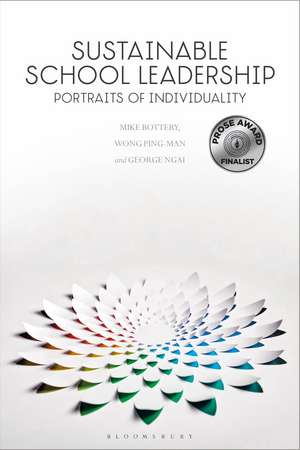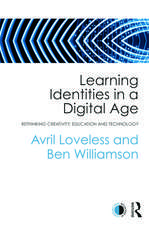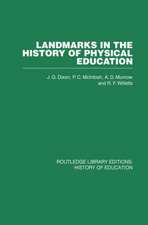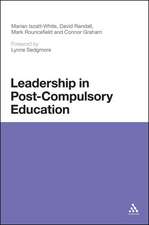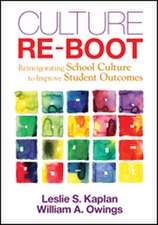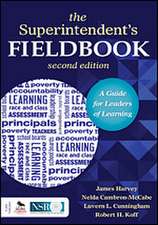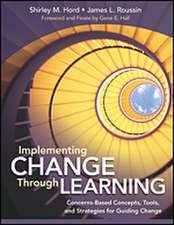Sustainable School Leadership: Portraits of Individuality
Autor Professor Mike Bottery, Wong Ping-Man, George Ngaien Limba Engleză Paperback – 27 iun 2018
| Toate formatele și edițiile | Preț | Express |
|---|---|---|
| Paperback (1) | 198.22 lei 3-5 săpt. | |
| Bloomsbury Publishing – 27 iun 2018 | 198.22 lei 3-5 săpt. | |
| Hardback (1) | 598.28 lei 6-8 săpt. | |
| Bloomsbury Publishing – 27 iun 2018 | 598.28 lei 6-8 săpt. |
Preț: 198.22 lei
Preț vechi: 258.12 lei
-23% Nou
Puncte Express: 297
Preț estimativ în valută:
37.93€ • 39.70$ • 31.57£
37.93€ • 39.70$ • 31.57£
Carte disponibilă
Livrare economică 10-24 martie
Preluare comenzi: 021 569.72.76
Specificații
ISBN-13: 9781350005228
ISBN-10: 1350005223
Pagini: 240
Ilustrații: 10 bw illus
Dimensiuni: 156 x 234 mm
Greutate: 0.36 kg
Editura: Bloomsbury Publishing
Colecția Bloomsbury Academic
Locul publicării:London, United Kingdom
ISBN-10: 1350005223
Pagini: 240
Ilustrații: 10 bw illus
Dimensiuni: 156 x 234 mm
Greutate: 0.36 kg
Editura: Bloomsbury Publishing
Colecția Bloomsbury Academic
Locul publicării:London, United Kingdom
Caracteristici
Informs current and future leadership research by highlighting how links between the micro-, meso- and macro-levels of education promote or discourage educational leadership sustainability
Notă biografică
Mike Bottery is Emeritus Professor of Education at the University of Hull, UK. He has published eight books on issues of educational leadership, values and sustainability, including The Challenges of Educational Leadership (2004) and Educational Leadership for a More Sustainable World (2016).Wong Ping-Man is Adjunct Professor of Education Administration at the University of Macau, China. He was director of leadership courses at the Hong Kong Institute of Education, China, and is currently Adjunct Professor of the Education University of Hong Kong, China. He has a long list of notable journal articles.George Ngai is Assistant Professor in educational leadership in the Education University of Hong Kong, China. He is a qualified headteacher, a school manager and has written a variety of articles in this area.
Cuprins
Introduction/PrefacePart I: Understanding the Issues1. Leadership Sustainability and the Beginnings of the Approach2. Sustainability and the 'Wicked' Reality of Educational Leadership3. Cross-cultural Issues of Leadership SustainabilityPart II: Understanding Leadership - the Research Evidence4. English and Chinese Responses to Leadership Challenges5. Patterns of Individual Responses to Challenges across Two Cultures6. The Importance of Organisational Contexts to Personal Leadership Sustainability7. The Importance of Individuality in Understanding Leadership ApproachesPart III: Developing Leadership Sustainability8. Using Portraits to Support Leadership Sustainability9. The Public and Private Lives of Educational Leaders10. Developing a Way Forward for Sustainable LeadershipReferencesIndex
Recenzii
A powerful and well-written text on a topic of significant contemporary interest to practitioners, students, and academics in the field of educational leadership. The writers are at the top of their game in exploring the many challenges that face school leaders across a number of countries.
Bottery, Ping-Man and Ngai offer an in-depth analysis of the complexity of sustainable school leadership. Through the development of portraits of school leaders in the UK and Hong Kong, the authors reveal the wicked problems of sustainability. This book is essential to the study and understanding of school leadership.
A book that all new senior leaders should be required to read. It is both well written and challenging. Taking a cross-cultural, research focused approach, the authors have put together a challenging yet inspiring book, which offers leaders help in framing their own leadership sustainability and that of others.
This comparative study uses narrative and portraiture to uncover the deep dilemmas facing principals in the distinctive cultural contexts of Hong Kong and the United Kingdom. Many rich dimensions of sustainability are explored as these school leaders describe how this experience with narrative has transformed their thinking and action. The further vivid self-reflection of the authors make this a compelling read for all who are concerned about schooling and the environment.
A much-needed book that presents an eloquent portrayal of the challenges characterising 21st-century school leadership. It is also a clarion call for conventional approaches to educational leadership to be revaluated if leaders are to be sustained in their roles into the future. The argument is complemented by the 'lived' experiences of school leaders themselves. These portraits inject their own validity and assertiveness in conveying the complexity of contemporary school leadership, how individuals make sense of this complexity and the various ways they deal with it. Written with both passion and incisiveness, the commentary is a powerful entreaty for school leaders to engage in new ways of learning, new dispositions and new behaviours. As such, it is one of those rare expositions that carries sufficient weight to help nudge the field of Educational Leadership in a slightly different direction.
Focuses on school leaders as individuals but refreshingly is not just an individualised analysis. Instead, compelling accounts of particular school leaders and their experiences are matched with a deeply thoughtful commentary that locates leadership within cultural, political and organisational contexts, and locally, nationally and globally as well. The complexities of school leadership come to life through the portrait methodology used and the contextual specificities highlighted. In a timely corrective to standardisation, Bottery, Ping-Man and Ngai suggest that leaders often do their best work when their individuality is supported rather than suppressed. In defying easy answers, this book is chock-full of insights for leadership practice today.
An elegantly written book which analyses why so many talented school Leaders leave their jobs early and why many others are not willing to take up their role. The sensitive and comparative approach used allows the authors to go beyond the superficial and trite attempts which have prevailed. The nuanced analysis and recommendations should be compulsory reading for Government ministers planning their next "new" policy initiative.
Bottery, Ping-Man and Ngai offer an in-depth analysis of the complexity of sustainable school leadership. Through the development of portraits of school leaders in the UK and Hong Kong, the authors reveal the wicked problems of sustainability. This book is essential to the study and understanding of school leadership.
A book that all new senior leaders should be required to read. It is both well written and challenging. Taking a cross-cultural, research focused approach, the authors have put together a challenging yet inspiring book, which offers leaders help in framing their own leadership sustainability and that of others.
This comparative study uses narrative and portraiture to uncover the deep dilemmas facing principals in the distinctive cultural contexts of Hong Kong and the United Kingdom. Many rich dimensions of sustainability are explored as these school leaders describe how this experience with narrative has transformed their thinking and action. The further vivid self-reflection of the authors make this a compelling read for all who are concerned about schooling and the environment.
A much-needed book that presents an eloquent portrayal of the challenges characterising 21st-century school leadership. It is also a clarion call for conventional approaches to educational leadership to be revaluated if leaders are to be sustained in their roles into the future. The argument is complemented by the 'lived' experiences of school leaders themselves. These portraits inject their own validity and assertiveness in conveying the complexity of contemporary school leadership, how individuals make sense of this complexity and the various ways they deal with it. Written with both passion and incisiveness, the commentary is a powerful entreaty for school leaders to engage in new ways of learning, new dispositions and new behaviours. As such, it is one of those rare expositions that carries sufficient weight to help nudge the field of Educational Leadership in a slightly different direction.
Focuses on school leaders as individuals but refreshingly is not just an individualised analysis. Instead, compelling accounts of particular school leaders and their experiences are matched with a deeply thoughtful commentary that locates leadership within cultural, political and organisational contexts, and locally, nationally and globally as well. The complexities of school leadership come to life through the portrait methodology used and the contextual specificities highlighted. In a timely corrective to standardisation, Bottery, Ping-Man and Ngai suggest that leaders often do their best work when their individuality is supported rather than suppressed. In defying easy answers, this book is chock-full of insights for leadership practice today.
An elegantly written book which analyses why so many talented school Leaders leave their jobs early and why many others are not willing to take up their role. The sensitive and comparative approach used allows the authors to go beyond the superficial and trite attempts which have prevailed. The nuanced analysis and recommendations should be compulsory reading for Government ministers planning their next "new" policy initiative.
